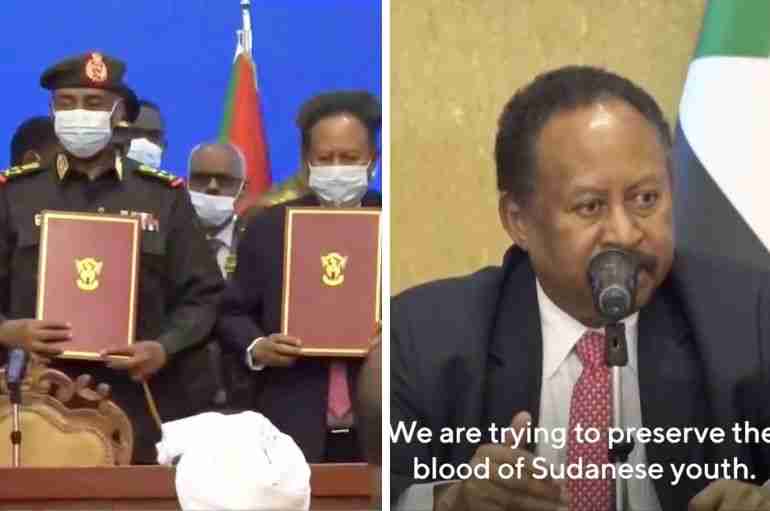After Its Coup, Sudan’s Military Has Reinstated The Prime Minister To Sign A New Power-Sharing Deal
After seizing power in a coup a month ago, Sudan’s military has reinstated the prime minister after he signed a new deal to share power with the military.

After seizing power in a coup a month ago, Sudan’s military has reinstated the prime minister after he signed a new deal to share power with the military.
Abdalla Hamdok was freed from house arrest and appeared on TV on Sunday Nov. 21 to sign the agreement with the coup leader, Lieutenant General Abdel Fattah al-Burhan.
The move comes after the military shot and killed at least 41 people and left hundreds injured during anti-coup protests that erupted following the takeover on Oct. 25, according to the New York Times.
Speaking at the ceremony, Hamdok said he agreed to sign the deal to end the bloodshed.
“We are trying to preserve the blood of Sudanese youth,” he said, Reuters reported. “I know our youth has the capacity for sacrifice, determination and giving up all that is precious. But Sudanese blood is precious, let us stop the bloodshed and direct the youth’s energy into construction and development.”
Under the agreement, Hamdok will lead a cabinet of technocrats for a transitional period with military oversight before elections can be held to hand power to a civilian government. The military will also release political prisoners.
However, it remains unclear how much power the government would hold, AP reported.
al-Burhan said that signing the declaration could “lay a genuine foundation to the transitional period,” adding that “free and transparent elections” would be held as part of the transitional process.
“We want to establish a true partnership with all national forces so that we can eventually build institutions that can take us forward,” he said.
The news was met with further protests, as pro-democracy demonstrators rejected the agreement as “a form of betrayal.”
Protesters see the deal as an “unacceptable concession to a military that has controlled Sudan for 52 years of its 60-year history and that is likely to severely hamper efforts to move the country toward democracy,” according to the New York Times.
Since then, people in Sudan have been taking to the streets in mass protests against the coup, but have been met with a violent crackdown from the military.
The military, which had been sharing power with civilian leaders in a transitional government for over two years, dissolved the government, arrested Hamdok and imposed a state of emergency on Oct. 25.
The coup and the subsequent crackdown was met with widespread international condemnation.





